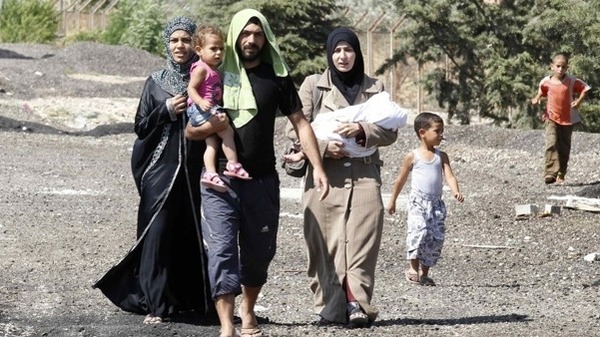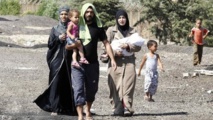Ali, 45, lives with his wife and three children in an informal refugee camp, that has no electricity or drinking water, on agricultural land where many refugees work long hours to eke out a meagre salary.
"No one in the world is working seriously to end the conflict so that we can go home," said Ali, who fled his home in the central Homs province at the onset of the conflict that began in March 2011.
Many of the more than four million Syrian now living as refugees in the Middle East and beyond share Ali's resentment and sense of abandonment.
"Over the years, we've realised that the promises made by the United States and others were just empty air," said Osama al-Raqa, 22, who missed out university because of the war.
"I dream of leaving to Europe," he said, in the same camp in the northern district of Minyeh.
"Europeans eat and live in houses. We, on the other hand, are homeless and the whole world treats us like a burden."
Syria's conflict began with anti-government protests but spiralled into a war after a regime crackdown.
It has since claimed more than 230,000 lives, according to the Syrian Observatory for Human Rights monitor.
- Refugees 'sinking into poverty' -
The UN refugee agency UNHCR said Thursday that the number of Syrian refugees now stands at 4,013,000 people, with another 7.6 million displaced inside the country.
"This is the biggest refugee population from a single conflict in a generation," UN refugee chief Antonio Guterres said in a statement.
"It is a population that needs the support of the world but is instead living in dire conditions and sinking deeper into poverty."
UNHCR said one million Syrians had become refugees in just the last 10 months, and the overall number could grow to 4.27 million by the end of the year if the pace continued.
The crisis is the largest handled by UNHCR in a single conflict for nearly 25 years, since the agency assisted some 4.6 million Afghan refugees in 1992.
Most Syrian refugees are sheltering in neighbouring countries, including Turkey, Lebanon, Jordan and Iraq, where many live in poverty with few legal protections.
"Worsening conditions are driving growing numbers towards Europe and further afield," Guterres said, adding that poverty was also driving increased child labour and early marriage among refugees.
UNHCR estimated that $5.5 billion are needed this year to help Syrian refugees and the increasingly overwhelmed communities hosting them.
By June it had received just 24 percent of that amount, forcing cuts to food aid and schooling for refugees.
- 'Nothing has changed' -
In Lebanon, where the government has not allowed the creation of formal refugees camps, host communities are struggling with an influx of more than one million Syrians.
That has strained the already-stretched resources of a country with only four million citizens, and prompted the government to tighten its borders and crack down on those without official papers.
"The police detained my four sons with seven other people on Sunday because they didn't have papers," said Khaled Sheikh, 53, who described the camp in Minyeh as like a prison.
"We don't have any work, and we can't leave the camp" for fear of arrest.
Syrians made up a third of the 137,000 people who tried to cross the Mediterranean to Europe in the first half of 2015, the UNHCR says.
Guterres urged European countries to do more to "fully assume their responsibilities and... extend the mechanisms of solidarity that have been created."
NGO Oxfam also urged the international community to "restore the lost faith in humanity of an entire generation" by donating more, taking in refugees and working to end the Syrian conflict.
On the ground in Minyeh, refugees said they had no expectation that the international community or the media would do anything to help.
"I don't want to talk to the media. I've been talking to the media for three years and nothing has changed," one woman said.
-------------------------------------------------------------------------------------------------------------------------
"No one in the world is working seriously to end the conflict so that we can go home," said Ali, who fled his home in the central Homs province at the onset of the conflict that began in March 2011.
Many of the more than four million Syrian now living as refugees in the Middle East and beyond share Ali's resentment and sense of abandonment.
"Over the years, we've realised that the promises made by the United States and others were just empty air," said Osama al-Raqa, 22, who missed out university because of the war.
"I dream of leaving to Europe," he said, in the same camp in the northern district of Minyeh.
"Europeans eat and live in houses. We, on the other hand, are homeless and the whole world treats us like a burden."
Syria's conflict began with anti-government protests but spiralled into a war after a regime crackdown.
It has since claimed more than 230,000 lives, according to the Syrian Observatory for Human Rights monitor.
- Refugees 'sinking into poverty' -
The UN refugee agency UNHCR said Thursday that the number of Syrian refugees now stands at 4,013,000 people, with another 7.6 million displaced inside the country.
"This is the biggest refugee population from a single conflict in a generation," UN refugee chief Antonio Guterres said in a statement.
"It is a population that needs the support of the world but is instead living in dire conditions and sinking deeper into poverty."
UNHCR said one million Syrians had become refugees in just the last 10 months, and the overall number could grow to 4.27 million by the end of the year if the pace continued.
The crisis is the largest handled by UNHCR in a single conflict for nearly 25 years, since the agency assisted some 4.6 million Afghan refugees in 1992.
Most Syrian refugees are sheltering in neighbouring countries, including Turkey, Lebanon, Jordan and Iraq, where many live in poverty with few legal protections.
"Worsening conditions are driving growing numbers towards Europe and further afield," Guterres said, adding that poverty was also driving increased child labour and early marriage among refugees.
UNHCR estimated that $5.5 billion are needed this year to help Syrian refugees and the increasingly overwhelmed communities hosting them.
By June it had received just 24 percent of that amount, forcing cuts to food aid and schooling for refugees.
- 'Nothing has changed' -
In Lebanon, where the government has not allowed the creation of formal refugees camps, host communities are struggling with an influx of more than one million Syrians.
That has strained the already-stretched resources of a country with only four million citizens, and prompted the government to tighten its borders and crack down on those without official papers.
"The police detained my four sons with seven other people on Sunday because they didn't have papers," said Khaled Sheikh, 53, who described the camp in Minyeh as like a prison.
"We don't have any work, and we can't leave the camp" for fear of arrest.
Syrians made up a third of the 137,000 people who tried to cross the Mediterranean to Europe in the first half of 2015, the UNHCR says.
Guterres urged European countries to do more to "fully assume their responsibilities and... extend the mechanisms of solidarity that have been created."
NGO Oxfam also urged the international community to "restore the lost faith in humanity of an entire generation" by donating more, taking in refugees and working to end the Syrian conflict.
On the ground in Minyeh, refugees said they had no expectation that the international community or the media would do anything to help.
"I don't want to talk to the media. I've been talking to the media for three years and nothing has changed," one woman said.
-------------------------------------------------------------------------------------------------------------------------









 Home
Home Politics
Politics











